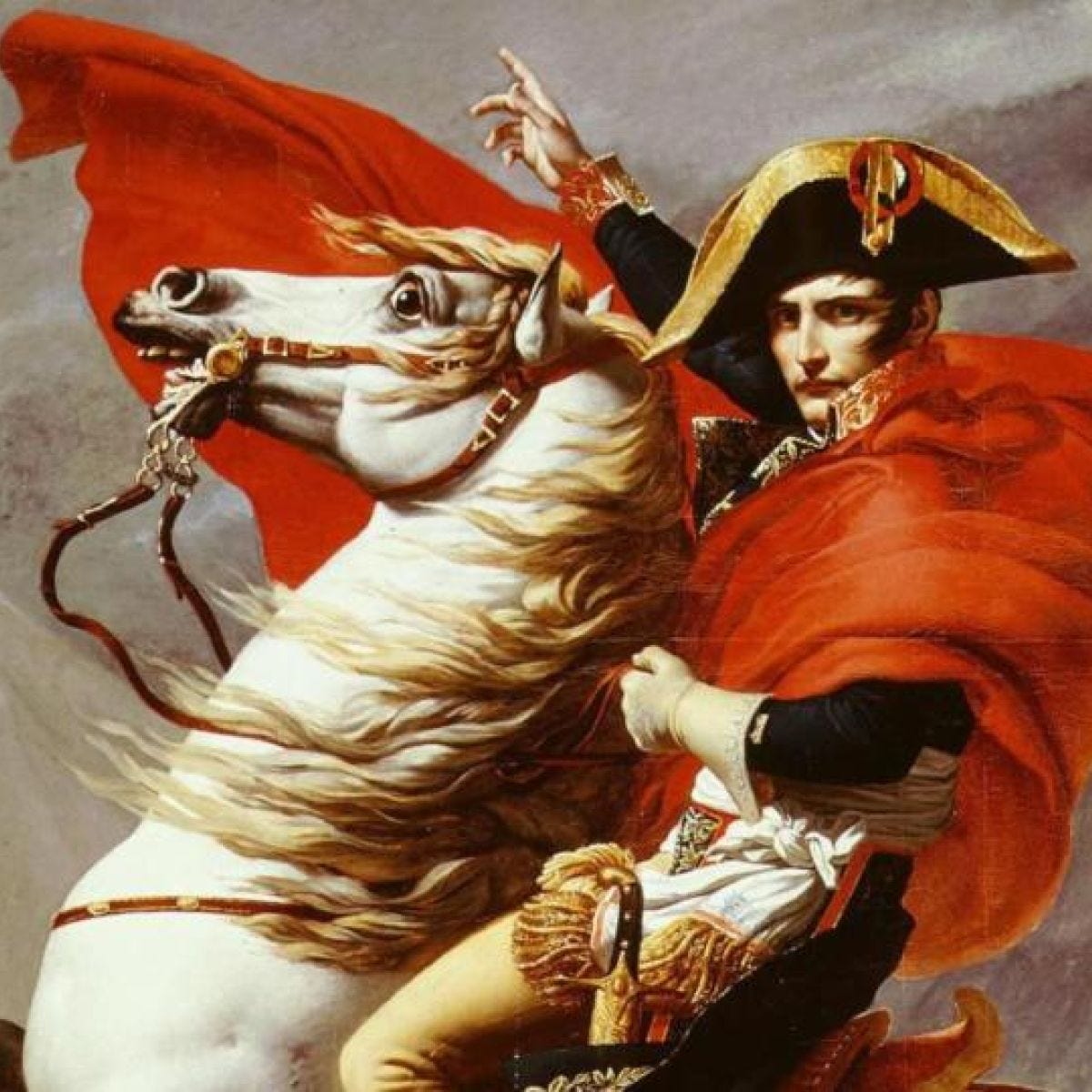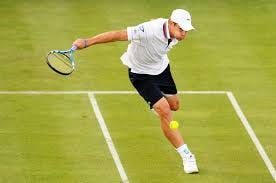This week, on July 14, 1789, French revolutionaries stormed the Bastille. The Bastille was a french fortress in Paris known for holding political prisoners. A large group of civilians surrounded and eventually captured it in an afternoon. Afterwards they stabbed to death several guards and put their heads on pikes. It’s an incredibly famous event now associated with many causes - revolt against tyranny, power of the common man, democracy, etc.

Today’s essay is a little different. I usually write ~1 page on a historical event that happened today. But last Monday I ended up writing far, far more about the Bastille and ended up with something very different. A little rambling and a little personal. I’ll go back to the normal format next week.
Whenever I read about the Bastille and France, I immediately think of Napoleon. I recently started a great biography of Napoleon. The book is incredible because it’s told largely from the context of the thousands of letters he wrote and used to govern, conquer, and mold one of the largest empires of all time. Much of the book borders on unbelievable - Napoleon single-handedly winning a battle and then retiring to his tent and personally handling a disagreement between two random Parisian citizens.
It’s easy to see Napoleon as otherworldly. A genius beyond understanding. But through the letters in his biography you see a real, flawed human being. Someone who yearned after others, faced rejection, failed, laughed, etc. Someone who affected millions of lives and changed the course of the world, but also someone who struggled with worry and confusion.

This brings up a question that I often think about: are there true, once-in-a-lifetime, move-the-earth geniuses? Are certain people almost predestined to change the world based on their innate characteristics?
Maybe. I go back and forth. But today I don’t think so. I’m sure Napoleon was a genius. And there’s no doubt he was an innovative tactician. But I think people also tend to overvalue innate intellect and undervalue something much simpler, but just as important - volume of quality experience.
“Napoleon Bonaparte commanded in more battles than any other general in history. By one count he exercised command in fifty-five major or significant battles . . . Of those battles he won forty-eight, drew three, and lost four.”
I recently finished grad school. One of my favorite insights revolved around the difference between earned experience and innate intelligence. It’s very hard to tell the difference. And most of the time it doesn’t matter. But if you see it once, you can’t unsee it.
Here’s a personal example. I have a lot of experience with strategy work. I have minimal experience with finance work. In my finance classes, my professor would often ask difficult questions that left me stumped. There were always a few students who could answer immediately. At first, I thought they were geniuses. But then I took a strategy class. It seemed like the professor was asking the easiest questions in the world. I couldn’t understand why everyone else was so dumb.
You see the obvious contradiction here, right? It’s not that anyone was a genius. Or that anyone was dumb. It’s that, to me, the strategy questions weren’t novel. I had seen them before, just with slightly different framing. Further, I had experienced the many different versions of that question and the even greater variations of answers. So when it was asked, I didn’t have to come up with an amazing answer. I just had to pick from the ‘answers’ I had already seen.
If you work with something for years, you will eventually see every variation of it. Then new things don’t seem new. They seem like a collage of old things. Easily and quickly solved.
I think the same thing probably happens with people like Napoleon. But there’s a very important distinction here that makes experience even more important for Napoleon. If I mess up a finance problem, I live to answer another one tomorrow. I can slowly build up that experience. That’s often not the case in war. If you lose a battle, you’re often killed or demoted.
Extreme negative consequences maximize the value of experience because they make it really, really hard to get even minimal training.
It’s like if every time a basketball team lost a game, you flip a coin and the coach has a 50% chance of being killed. After a few years of this, you’d be left with just 2-3 incredible coaches with years of experience and a big pile of dead coaches. The next year those 2-3 coaches will have played 100s of games while the rest of the field is just starting out and making dumb mistakes. Occasionally, someone might be smart enough or weird enough to break through and join that cohort of 2-3, but it’d be really hard. It’s not that the 2-3 coaches are innately better. It’s that they’ve had the benefit of compounded experience. If you’ve read anything about growth mindset, this should be starting to sound very familiar.
Where else is it particularly hard to get even minimal training and experience? The two obvious answers are activities that require extreme amounts of preparation and activities dependent on natural, in-the-moment responses. Let’s look at both.
There are certain activities that require extreme amounts of preparation or expense. This makes experience very hard to come by and very limited. In these fields, if you can find a way to manufacture even a very tiny amount of extra experience, it can have a huge effect. For example…
“Here’s the thing,” Mikaela told me one day. “You can’t get ten thousand hours of skiing. You spend so much time on the chairlift. My coach did a calculation of how many hours I’ve been on snow. We’d been overestimating. I think we came up with something like eleven total hours of skiing on snow a year. It’s like seven minutes a day. Still, at the age of twenty-two, I’ve probably had more time on snow than most. I always practice, even on the cat tracks or in those interstitial periods. My dad says, ‘Even when you’re just stopping, be sure to do it right, maintaining a good position, with counter-rotational force.’ These are the kinds of things my dad says, and I’m, like, ‘Shut up.’ But if you say it’s seven minutes a day, then consider that thirty seconds that all the others spend just straight-lining from the bottom of the racecourse to the bottom of the lift: I use that part to work on my turns. I’m getting extra minutes. If I don’t, my mom or my coaches will stop me and say something.”

Think about alpine skiing. You have to drive out there, warm-up, get dressed, take the ski-lift up, wait your turn, etc. And then you get about 10 seconds to ski down the ramp. You’re out there for hours, but you’re only doing the thing for 7 minutes.
This is also one of many reasons why athletes today are so much better than in the past. Modern training often reduces the prep or expense completely, e.g., virtual driving ranges, VR training for soldiers, batting cages, etc.
There are also certain activities that revolve entirely around an element of in-the-moment reactions. It’s very hard to manufacture something like a surprise. Go ahead and try it right now. Surprise yourself. It’s impossible.
I was on my college tennis team and learned this first hand. I desperately needed to improve my ‘on the rise approach shot.’ This happens when, in the middle of a point, someone hits the ball a little weaker than expected and you immediately move forward and hit an aggressive shot back. This was almost impossible to train. To be clear, it’s easy to THINK you’re training this. You can set up a ball machine and hit 1000 in a row. But what makes this shot difficult is not the mechanics. It’s the 180 degree shift in mindset from defensive to offensive. If you know it’s coming, then you’ve taken out the hardest part.

So I took a page out of Mikaela’s book. Every day at practice we would warm up for 20 minutes. This was usually a casual time to hit the ball down the middle. Instead, I would seize on any weak shot and play it aggressively. It made me really annoying to warm up with. But it also made me exceptionally good at this one specific type of shot. Most people were only able to practice it a few times a week. I was easily getting 10-20 per day.
This is also why things like public speaking can be very hard to get better at. You can’t really simulate the appearance of being in front of a big crowd. You either are or you aren’t. You’re either nervous or you aren’t. Yes, certain mechanical tricks can help you reach a baseline, but you’ll typically hit a wall unless you can manufacture a scenario where you give a high volume of real speeches. As we’d expect, similar to Napoleon and generals, we see that most people suck at public speaking and a select few seem like otherworldly geniuses. Experience accrues.
It’s worth noting right now that nothing I’m saying is new. I’m just having fun putting small historical moments and personal anecdotes into a related context. All of this also may be missing the point entirely. Look at great man theory and its criticisms.
Ok, so where are we? We’ve identified a few things:
Sometimes what looks like genius is really just experience
That experience compounds, making someone better and better
It’s even more important for fields with extreme negative consequences, high preparation costs, and in-the-moment reactions
But what about fields where experience is easy to come by? Will quantity of experience matter more or less?
I think the answer is: about the same. I once took a class on industrial design sketching. Every week we were given a product brief and then we drew ideas. And more ideas. And more ideas. And even more ideas. It’s one of the best classes I’ve ever taken. I had a huge epiphany half-way through. I was very upset at the time because I was stuck. I was trying to design a bus stop and kept struggling with the same 5 bad concepts. My professor stopped by at one point and, in 2 minutes, drew about 15 different concepts. It had taken me several hours to draw 5 concepts. Yes my professor was probably innately talented at this work. But that wasn’t the major reason he was better than me. He was better because he maximized his experience and the quantity of his output. Let’s say that maybe 1 in every 10 of our ideas is solid. My professor can get to several solid ideas in a few minutes. For me it takes days. Meanwhile, this compounds over years until he has experience drawing 1000s of concepts and I have experience drawing just a few.
There’s another important point here we keep dancing around - quality of experience. If you get a bunch of bad experiences, it’s just as bad as no experience. Playing Call of Duty won’t help you on a real battlefield. There’s a bunch of interesting, highly popular research and discussion around this as well (google ‘deliberate practice’ and ‘10,000 hours’).
I think we all intuitively know that there aren’t any short cuts. You just have to do the thing a lot. Yet I know I constantly find ways to avoid ‘doing the thing.’ And our education system and the way we give feedback doesn’t help. We measure memorization and use multiple choice answers and give feedback about everything but the thing.
This has quickly devolved away from the Bastille. Let’s end with some final thoughts.
A significant percentage of performance differences may come from experience and / or speed of iteration. It’s easy to think some people are wildly dumb or wildly smart, but this is wrong. Someone can answer that complex finance question easily and quickly because they’ve heard something similar already (experience); someone can come up with a creative and unique solution to a marketing problem because they came up with 100 bad ones first (iteration).
It’s not about quantity over quality, it’s about quantity then quality. You do amazing work by doing a ton of work. But at some point you need to make time for polishing. Practically, this means that you need to find a unit of quantity that you can max out experience and iteration on. Practically it’s also a little depressing because it means you can’t be good at something immediately due to ‘talent’ unless there’s some unknown crossover element from your past experience.
This has one inspiring and one deflating conclusion. It’s inspiring to know that the world was made by flawed and normal people (i.e., I can make the world just like they did). It’s deflating to know that there probably aren’t magical, innately talented people out there with all the answers (e.g., never meet your heroes).
Like I said, this ended up being a little longer and wide ranging than my usual posts. If you enjoyed it, I’d love for you to forward it to a friend who might be interested, reply with your thoughts, or sign up for more here :)
We’ll end with one of my favorite quotes…
“Sometimes, magic is just someone spending more time on something than anyone else might reasonably expect.”
-Teller of Penn & Teller
Related thoughts that felt too tangential to include...
01
If you’re a Napoleon expert, you might point out his quote: “I have fought sixty battles and I have learned nothing which I did not know at the beginning. Look at Caesar; he fought the first like the last."
It seems like it might contradict us, but I think he’s proving a separate point here - the importance of insight. And how if there’s a meta change (this is the phrase used in video games to signal the shift from one popular style of play to a new one) experience no longer matters. It’s one of the few ways that experience can be overcome. Something about the world fundamentally changes, but something about that change leads others to both not see it and to not believe it when they do. Let’s go back to that point in the hypothetical basketball tournament where we said someone might be weird enough to break through. Thinking back to our basketball example, you can imagine that if someone seized on the importance of the 3 pointer early, they would be able to overcome that lack of experience. While still ‘fighting the first like the last.” In war you see this with big technology shifts or tactics shifts. For example - the invention of the longbow and the death of the knight. The invention of guns and the death of the charge. The invention of concentrated fire and mobile supply chains in Napoleon’s case. Etc.
02
I think the same thing probably applies to celebrity CEOs. Modern history is full of famous executives that seem to create massive, successful companies seemingly whenever they want - think Steve Jobs with Next, Pixar, and Apple or Elon Musk with Tesla, SpaceX, and PayPal. I’m sure these people are smarter than average. But I wonder how much of their success is due to innate intelligence vs compounded experience. Is there anyone else in the world that has run 2 huge, hyper-innovative companies at the same time besides Elon Musk and Jack Dorsey? That type of experience is truly unique. And it compounds, giving them more unique opportunities.
Look at these people again and you’ll find something else they have in common. They all did it early. They gain a relative ‘lifetime’ of experience in something while still young. This is why where you start can be so important. There’s a big difference in being able to take that free internship or get that cool software or meet that amazing mentor vs not. When it comes time to start your own company or interview at the perfect job, you’ll be better. When you start to think about the importance of exposure and experience instead of innate talent and genius it changes how you think about accessibility and equity.
03
Another interesting place to take this is idea generation. Look for fields where it’s really really difficult or rare to do the thing. Then find ways to artificially increase your access to training. You often see this played with in movies through montage scenes, e.g., someone needs to get really good at negotiating so they go down to the market every day and trade goods for months.
05
There’s another really interesting example here. MMA. It’s really, really hard to get real training in a fighting sport. Why? Because you can only get hit in the head so many times. There’s only one martial art that you can spar at full intensity every single day. Jiu-jitsu (BJJ). If you do that with boxing, you’ll be done in a week. But in BJJ, you can tap out. They’ve found a way to maximize those fighting minutes. That’s one (of the many) reasons why every champion MMA fighter for years came from a BJJ background. Partly because most fights go to the ground, but also because the art itself is far more masterable. There’s a big difference between working a punching bag and actually trying to strangle someone actually trying to strangle you.


